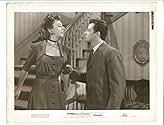Cornell Wilde is the county attorney in the small Kansas town of Jericho. His best friend is Kirk Douglas, the editor of the local newspaper. Wilde is running for Congress, but the appearance of Anne Baxter, who left town a child and has come back a lawyer, stops Wilde from running. He does not wish to go to Washington with his always angry wife, Ann Dvorak. Instead, Douglas and his gossipy wife, Linda Darnell go to Congress, and Miss Baxter leaves for Kansas City rather than begin a "tawdry, backstreet affair." But when Colleen Townsend is accused of murdering a man in Jericho. Miss Baxter calls in Wilde to get her back to Jericho and assist in the defense.... despite the gossip.
It's director John Stahl's last tear jerker, a genre he excelled in in the 1930s. He would round off his career with two light comedies and die in 1950 at the age of 63. At first I wondered why Stahl had been the choice for this movie, instead of 20th Century-Fox's resident master of small-town life, Henry King. The answer soon became clear. The set pieces that open the movie are looks at the neighborhoods and relationships during the Mauve Decade that offer edgy, disapproving looks at the small-minded and evilly gossipy people who make the venue a purgatory, even as sentimental songs come out of Victrolas and pianolas. Stahl excelled in the portrayal of nastiness under the calm facade. King liked small towns.
I didn't enjoy the movie much. This sort of weeper has never been my cup of tea, and the big ending with a trial, a shooting, and Wilde lying in a hospital bed, possibly dying (surely not in a Hollywood movie!) was way over the top for me. But there's no arguing that Stahl's acerbic attitude toward the "nice" people is on full display here.
























